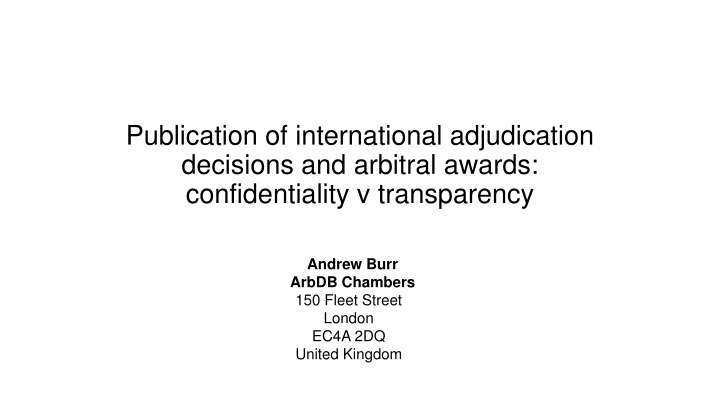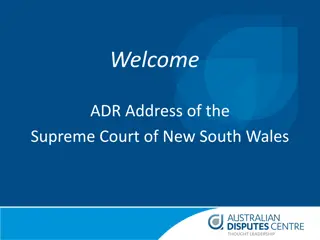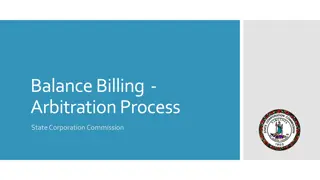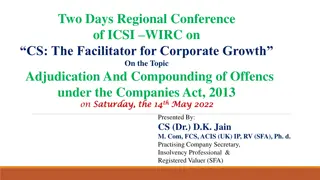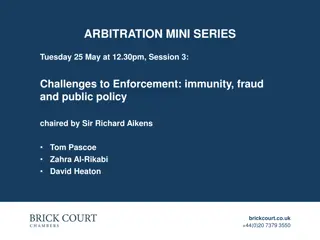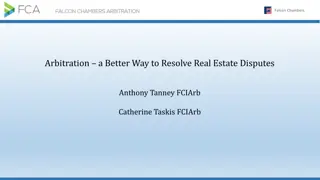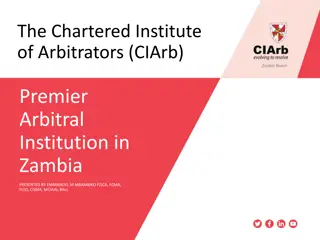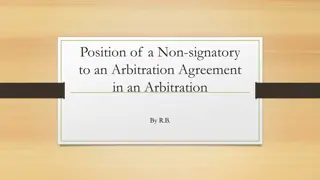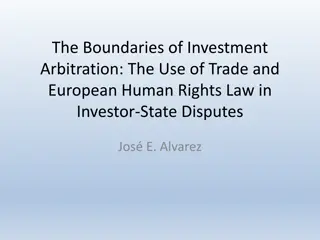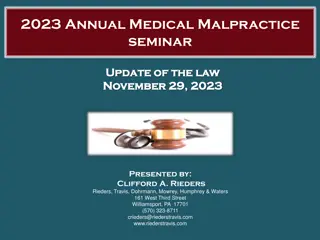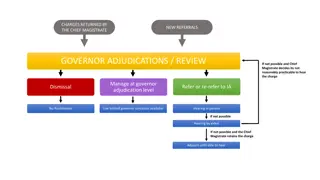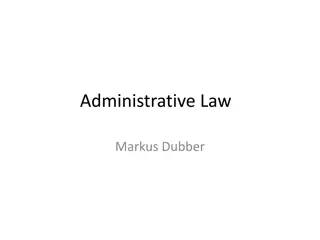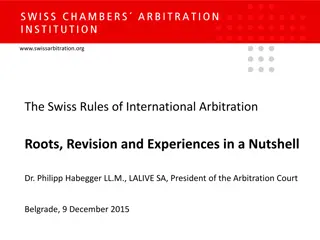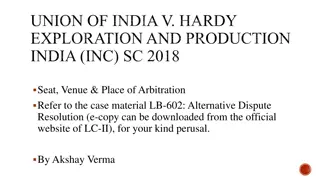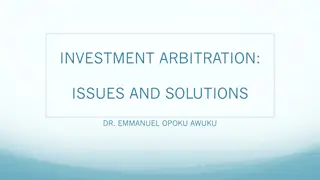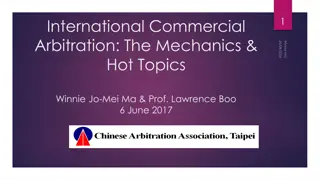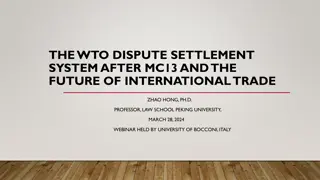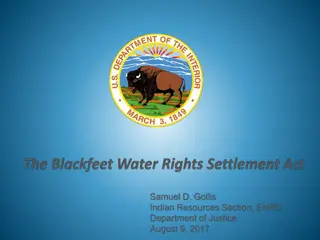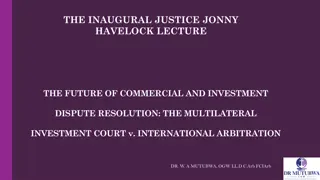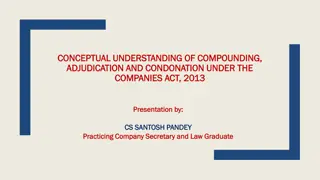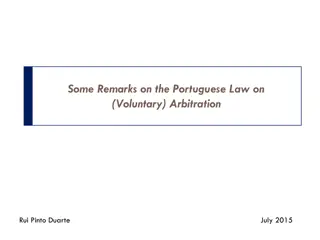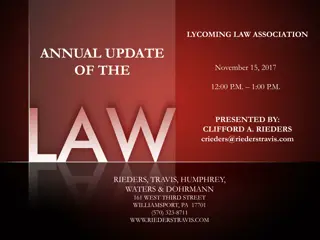The Importance of Transparency in International Adjudication and Arbitration
This article explores the tension between confidentiality and transparency in the publication of international adjudication decisions and arbitral awards. It highlights the significance of accurate law reporting for precedent cases under Common Law systems and discusses the erosion of such systems when important cases are decided by private judges.
Download Presentation

Please find below an Image/Link to download the presentation.
The content on the website is provided AS IS for your information and personal use only. It may not be sold, licensed, or shared on other websites without obtaining consent from the author.If you encounter any issues during the download, it is possible that the publisher has removed the file from their server.
You are allowed to download the files provided on this website for personal or commercial use, subject to the condition that they are used lawfully. All files are the property of their respective owners.
The content on the website is provided AS IS for your information and personal use only. It may not be sold, licensed, or shared on other websites without obtaining consent from the author.
E N D
Presentation Transcript
Publication of international adjudication decisions and arbitral awards: confidentiality v transparency Andrew Burr ArbDB Chambers 150 Fleet Street London EC4A 2DQ United Kingdom
In his entertaining and erudite address to celebrate the 150th anniversary of The Incorporated Council of Law Reporting for England and Wales, Lord Neuberger drew particular attention to the following wartime words of Lord Atkin in his famous (if not infamous) speech in Liversidge v Sir John Anderson, described in the Foreword to the 150th Anniversary Edition of the Law Reports as a dissent of power, eloquence and passion
The Lord Chief Justice went on to point out in his Foreword: judgment, for, less than 40 years later, Lord Diplock was to accept in R v Inland Revenue Comrs, Ex p Rossminster Limited that Lord Atkin was right: First, the case demonstrates the importance of a dissenting that the majority of this House in Liversidge v Anderson were expediently and, at that time, perhaps, excusably, wrong and the dissenting speech of Lord Atkin was right. For my part I think the time has come to acknowledge openly decision and to withstand all pressures. The then Lord Chancellor attempted to persuade Lord Atkin to omit his reference to Alice in Wonderland; and Viscount Maugham subsequently wrote to The Times to deplore Lord Atkin s characterisation of the Crown s arguments as those which might have been used at the time of Charles I. The case thus illustrates why Lord Atkin must be regarded as one of our greatest judges . Second, it demonstrates the courage necessary to take an unpopular
This quotation of antique authority serves the sole purpose of emphasising the immense importance under Common Law systems of having accurate and comprehensive law reporting, where such systems inherently depend upon reference to precedent cases.
Such a system is inevitably eroded when important cases (and issues) are decided by private judges , as has happened, by way of example, in the United Kingdom, following the coming into force of the Housing Grants, Construction and Regeneration Act 1996 (the HGCRA) (as amended by the Local Democracy, Economic Development and Construction Act 2009 ( the LDEDCA)) and, on the international stage, by ad hoc, or institutionally administered, arbitration.
This paper sets out to weigh in the scales of balance the question of confidentiality, which is so vital to private adjudicatory proceedings (such as domestic UK adjudication proceedings, dispute adjudication boards (DABs) under FIDIC and other standard form contracts and international commercial arbitration), with the perceived need for greater transparency and a level playing field , in which all participants (not just the MAFIA!) are able to source any relevant precedent. The availability of such precedent is seriously eroded when adjudicators, DABs and arbitral tribunals make decisions (for example, upon the proper interpretation of commonly-used standard forms), which never see the light-of-day in the public domain, unless the decision in question happen to become the subject-matter of enforcement proceedings (usually (in England and Wales) in the Technology and Construction Court), or on appeal (usually (in the same jurisdiction) in the Commercial Court).
Confidentiality As Avv Mauro Rubino-Sammartano accurately observes at section 19.17 of his International Arbitration Law (under the heading Confidentiality of the award ): The award, contrary to court decisions, is not in the public domain until it is published, with the consent of a party, or it is attacked before a court or its recognition is applied for. The problem of classifying a possible breach of confidentiality by the arbitrators, or by participants to the proceedings, has been raised. It has been argued that such conduct would amount to a breach of confidence. The publication of awards is in a border-live region between the duty to preserve confidentiality on the one hand, and the great advantage which their publications provides in the study and progress of the law of arbitration on the other. The formula of publishing long passages of awards, from which the names of the parties has been eliminated, tries to satisfy both requirements.
The publication of awards is expressly allowed by the Russian arbitration rules: With the permission of the President of the Arbitration Court the awards of the Court may be published in periodicals or in special collections of awards. The interests of the parties shall be taken into account and in particular information containing identification of the parties, enterprises commodities and prices shall not be published and in the Polish arbitration rules: in juridical and commercial periodicals, but without designation of the parties . The President of the Court of Arbitration may order the award to be published of Arbitration: However, the duty of secrecy is expressly specified for the arbitrator by the Polish Court He shall be bound to observe secrecy .
In a similar vein, sections 2-818 and 2-819 of Volume 1 of the lilac-hued (and somewhat long in the tooth ) fourth edition of Bernstein s Handbook of Arbitration and Dispute Resolution Practice read as follows (under the heading Confidentiality of the Award ): cases make clear, it may be disclosed to a third party if it is reasonably necessary for the establishment or protection of an arbitrating party s legal rights in relation to that third party 2-818 An arbitration award is confidential. As the
Transparency At section 3.6 of Rubino-Sammartano, the author seeks to distinguish between arbitral and court precedents, as follows (under the heading (a) Arbitral precedents ): Arbitral precedents have no binding nature, as the Arbitral Tribunal (Cremades, Chairman, Pereira and Redfern) stated in Liberian Easterfi Timber: arbitration tribunal , 'although the Arbitral Tribunal is not bound by the precedents of another ICSID but they are carefully examined by the arbitrators, who state: 'it is not without interest to note their construction and who, after having quoted several precedents, state that they constitute: a useful guide to the Arbitral Tribunal for the assessment of the damages .
One could say that arbitral precedents have a persuasive value, if this is construed as a simple possibility for persuading the arbitrator, instead of an indirectly compulsory directive.
Even Derains in his comments on this award states: are fundamentally based on arbitral precedents, summaries of which have already been published . The reasons given by the arbitrators in this matter and 2762 go even further: The awards made in 1977 in ICC proceedings Nos. 2745 an ICC arbitration would not be bound by a previous award rendered between the same parties and on the same matters by another arbitrator also sitting in an ICC arbitration . It would be paradoxical to hold that an arbitrator sitting in
New York Bar survey In February 2014, the New York City Bar published a Report by its Committee on International Commercial Disputes, entitled Publication of International Arbitration Awards and Decisions, surveying ten major international institutions and identifying and summarised the following issues posed by publication of such awards and decisions.
Further researches In a similar vein, the author of this paper has carried out a simple comparative survey of many major international arbitral institutions, the results of which are set out in tabular form in the appendix hereto. This appendix examines the extent to which the various sets of international rules do (or do not) encourage the publication of redacted awards.
One particular issue which arises (particularly under the FIDIC contracts, which use a multi-tiered dispute resolution process) is what the parties should do where a DAB has not been constituted. This question is particularly pertinent in circumstances where one of the parties attempts to delay and disrupt the constitution of an ad hoc DAB, which has to be put in place in order to resolve a specific dispute (as opposed to a standing DAB appointed at the outset of a project). Absent a DAB, how can any dispute be referred to it? Can such a dispute be referred directly to arbitration (or litigation) instead?
The standard FIDIC terms do not themselves provide a clear answer to these questions. However, it has been suggested by some commentators that an answer could be found in sub-clause 20.8. Although entitled Expiry of Dispute Board sAppointment (which could be interpreted as applying solely where a DAB is already implemented), the clause states that the provisions relating to the DAB do not apply and a dispute may be referred directly to arbitration in circumstances where there is no [DAB] in place, whether by reason of the expiry of the [DAB s] appointment or otherwise (emphasis added). The phrase orotherwise may, perhaps, offer a possible answer to the question, although it is by no means a clear-cut one.
ILLUSTRATIONS Tubular Holding (Pty) Limited v DBT Technologies (Pty) Limited (SGHC case no. 06757/2013); Stefanutti Stocks (Pty) Limited and S8 Property (Pty) Limited (SGHC case no 20088/2013)
Case 4A_124/2014 (Swiss Federal Tribunal ) The decision contains helpful analysis of the relevant FIDIC provisions, which could be applied equally in other jurisdictions. As part of the analysis, the Swiss Supreme Court considered the wording of sub-clause 20.8, the words orotherwise being described as a very vague expression , although it stated: interpreting it literally and extensively would short-cut the multi-tiered alternative dispute resolution system imagined by FIDIC when it came to a DAB ad hoc procedure because, by definition, a dispute always arises before the ad hoc DAB has been set up, in other words, at a time when there is no DAB in place , however such interpretation would clearly be contrary to the goal the drafters of the system had in mind .
- Peterborough City Council v Enterprise Managed Services Limited (2014). [2014] EWHC 3193 (TCC) [2014] 2 All ER (Comm) 423; [2014] BLR 735; - All Waddan Hotel Limited v Man Enterprise Sal (Offshore) (2014). [2014] EWHC 4796 (TCC); - PT Perusakaan Gas Negara (Persero) TBK v CRW Joint Operation (2014) [2014] SGHC 146 [2015] BLR 119, [2015] 155 Con LR 169.
The ICC has most helpfully also published issue 1 for 2015 of the Dispute Resolution Bulletin, containing 16 ICC interim, partial and final awards and procedural orders in redacted form, thereby assisting legal practitioners to gauge precisely how arbitral tribunals are likely to construe clause 20 and similar provisions.
Elina Zlatanska To Publish or Not To Publish, Arbitral Awards: That is the Question (2015) p. 36 : include express provisions as to the publication of awards with reasons and also provide model clauses dealing with confidentiality before and after the award is rendered. Institutions that have some publishing experience should publish guidelines for the publication of awards that others can follow. The efforts of the Milan Chamber of Commerce to that effect are commendable and serve as a useful example ... the arbitral institutions need to amend their rules to
Klaus Peter Burger The Creeping Codification of Lex Mercatoria, citing Philippe Fouchard, L arbitrage commercial international (Alphen aan den Rijn: Kluwer Law International, 2010), p.85 : itself an autonomous system of law, this law has to be made known to all those who have an interest in it: the arbitrators should not resemble the ancient pontiflex of antique Rome, who jealously kept the knowledge of law for themselves and with it the religious and political power. If the international community of merchants aspire to give
Nicholas Towers Expanding Horizons in Commercial Arbitration: The Case for the Default Publication of Awards (2015) : follows: Any award may be published 30 days after the award becomes available to the parties and no earlier, and any such publication shall be in a redacted format as may be prescribed, and shall preserve the anonymity of the parties and their representatives and identify only the members of the tribunal. ... a possible draft... amendment [to the Arbitration Act 1996] is as Confidentiality of the award Unless otherwise agreed by the parties Notwithstanding (1), if any party, at any time before the expiry of 30 days after the award becomes available to the parties, makes a request in writing to the tribunal asking that the award not be published, the award shall not be published unless otherwise provided for by law
The little fishes of the sea, They sent an answer back to me. The little fishes answer was We cannot do it, Sir, because . !
Andrew Burr ArbDB Chambers 150 Fleet Street London EC4A 2DQ United Kingdom
